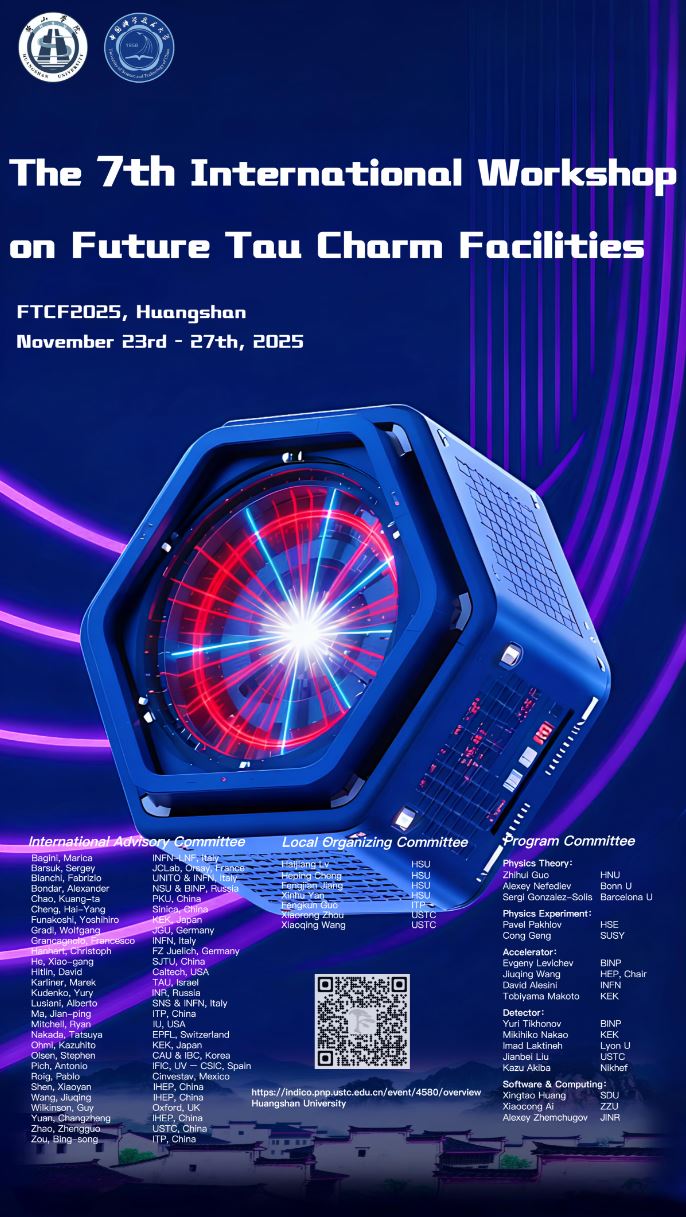The International Workshop on Future Tau-Charm Facilities, referred to as FTCF2025 will be hosted by Huangshan University, in Huangshan, China, in Nov. 23 - 27, 2025. The workshop is the 7th edition in the series of the joint workshops on future tau-charm facilities that was first held in Orsay (2018), and then in Moscow (2019), Hefei (2020, online), Novosibirsk (2021, online), Hefei (2024) and Guangzhou (2024). It's worth mentioning that there have been International Wrokshops focusing on discussion of the Super tau-Charm Facility projects in China and Russia, respectively, which were held in Hefei (2015), Beijing (2018) and Novosibirsk (2018).
In the field of particle physics research, the tau-charm energy region has unique properties, rich frontier physics topics, and great potential for scientific discoveries. The next generation of tau-charm facility projects have been proposed and extensively discussed. With a peak luminosity two orders of magnitude higher than that of the currently operating Beijing electron-positron collider (BEPCII), and twice the energy range, such facilities will provide a key platform for deepening the study of the internal structure of hadrons, searching for exotic states, and understanding the nature of non-perturbative strong interactions, exploring the asymmetry of matter-antimatter in the universe (CP violation), and probing new physics beyond the standard model. The construction of the facilities will challenge many of the world's cutting-edge accelerator and detector technologies. The workshop will bring together experts and researchers from around the world to explore the physics potential of future high-luminosity tau-charm facilities, review progress in accelerator and detector designs and R&D, discuss new ideas for accelerators, detectors and data processing, and facilitate the formation of international collaborations.
WeChat QR code:

The workshop program features plenary and parallel sessions covering the following topics for future high-luminosity tau-charm facilities:
- Hadron spectrum and hadron structure
- Flavor physics and CP violation
- Detector design and R&D, novel technologies
- Accelerator physics and technologies
- Software and computing
Conference Dates: November 23 – 27, 2025
- Sunday, November 23: Registration
- Monday, November 24 – Thursday, November 27: Scientific Sessions & Talks
Program: Plenary and Parallel sessions:
| Nov. 24 | Nov. 25 | Nov. 26 | Nov. 27 | |
| Morning | Plenary (08:30 - 12:30) |
Parallel (09:00 - 12:00) |
Parallel (09:00 - 12:00) |
Parallel (09:00 - 12:00) |
| Afternoon | Plenary (14:00 - 18:00) |
Parallel (14:00 - 18:00) |
Free | Plenary (14:00 - 18:00) |
| Evening | Banquet |

